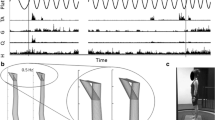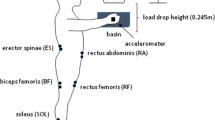Abstract
The purpose of this study was to examine effects of experience with a postural task on components of the automatic postural response including: (1) probability of activation of functionally appropriate postural muscles; (2) number of functionally appropriate postural muscles activated; and (3) onset latencies of functionally appropriate postural muscles in infants. Infants (n=15; age 36–48 weeks old) able to pull themselves into a standing position but not able to walk independently were tested using a postural task requiring the infant to stand and balance, with support, following a forward or backward movement of the support surface (platform perturbation). Infants were tested twice at 5-day intervals. One-half of the infants, the training group, were given intense platform perturbation training on the days between test sessions. Infants in the second group were also brought into the laboratory on the days between test sessions but were not exposed to platform perturbations during those days. Electromyograms of six leg and trunk muscles were recorded during test sessions to provide muscle onset latencies, probability of muscle activation data, and the number of postural muscles activated following a perturbation. Training infants demonstrated significant increases in probability of activating functionally appropriate muscles with tibialis anterior, quadriceps, and abdominal muscles activated in response to backward sway and gastrocnemius muscle in response to forward sway. The number of functionally appropriate postural muscles activated in a single trial also increased in the training group. There were no significant changes in mean postural muscle onset latencies or number of trials with antagonist muscle coactivation for either training or control groups. These findings suggest that during development selective parameters of the automatic postural response are affected by experience with the postural task.
Similar content being viewed by others
Author information
Authors and Affiliations
Additional information
Received: 30 November 1996 / Accepted: 12 September 1996
Rights and permissions
About this article
Cite this article
Sveistrup, H., Woollacott, M. Practice modifies the developing automatic postural response. Exp Brain Res 114, 33–43 (1997). https://doi.org/10.1007/PL00005621
Issue Date:
DOI: https://doi.org/10.1007/PL00005621




